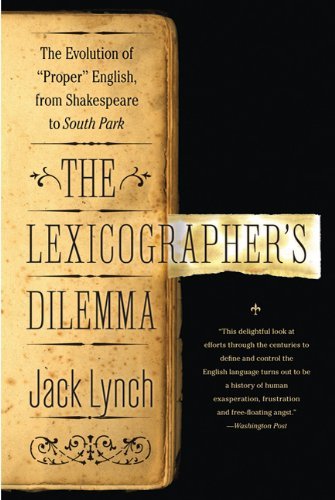What do you think?
Rate this book


336 pages, Paperback
First published January 1, 2009

. . . the most stigmatized word in the language . . . [which] every five-year-old is taught is not a word. But why not? Just because. It originally entered the language as a contracted form of am not (passing through a phase as an’t before the a sound was lengthened) and first appeared in print in 1778, in Frances Burney’s novel Evelina. We have uncontroversial contractions for is not (isn’t) and are not (aren’t), so what’s wrong with reducing am not to ain’t? The problem is that it was marked as a substandard word in the nineteenth century, people have been repeating the injunction ever since, and no amount of logic can undo it. It’s forbidden simply because it’s been forbidden.
. . . if including everything scientific is impossible, so is excluding everything scientific. Everyone recognizes the need to include some scientific words like fruit fly, koala, carbon, and salt. But why should a lexicographer include daffodil and atom but omit brasolaeliocattleya (a kind of orchid) and graviscalar bosons (theoretical subatomic particles)? There’s no difference in the character of the words, only in the familiarity of the things they identify. If some future technological breakthrough makes us all familiar with graviscalar bosons, they’ll eventually show up in the major general dictionaries. Until then, they have to remain in the language’s antechamber.
The notion that particular words are taboo can probably be traced back to primitive beliefs about sympathetic magic, in which language can be used to injure people at a distance. It’s telling that many of our unseemly words are known as curses, since the conception of offensive language seems to have derived from a belief in the power of a malefactor to place a curse on an enemy.
Convention exists, of course it does, but convention is no more a register of rightness or wrongness than etiquette is, it’s just another way of saying usage: convention is a privately agreed usage rather than a publicly evolving one. Conventions alter too, like life. . . . Imagine if we all spoke the same language, fabulous as it is, as Dickens? Imagine if the structure, meaning and usage of language was always the same as when Swift and Pope were alive. Superficially appealing as an idea for about five seconds, but horrifying the more you think about it.
If you are the kind of person who insists on this and that ‘correct use’ I hope I can convince you to abandon your pedantry. Dive into the open flowing waters and leave the stagnant canals be.
But above all let there be pleasure. Let there be textural delight, let there be silken words and flinty words and sodden speeches and soaking speeches and crackling utterance and utterance that quivers and wobbles like rennet. Let there be rapid firecracker phrases and language that oozes like a lake of lava. Words are your birthright.